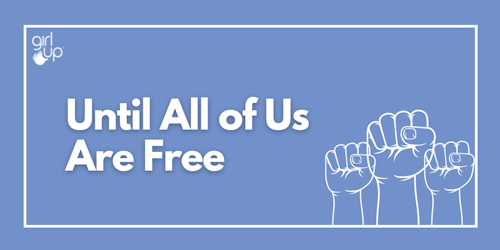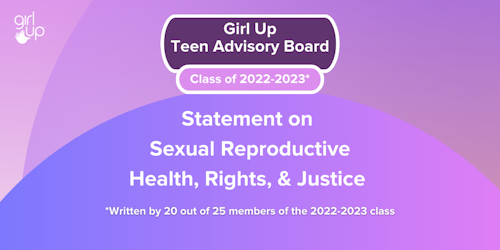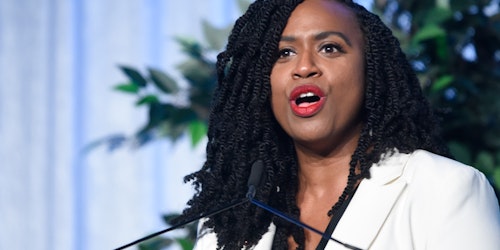Estimated reading time: 10 minutes
As the Girl Up 2023-2024 Global Teen Advisory Board, we deeply regret and condemn the Iranian Parliament’s passing of the new Chastity and Hijab Bill, sanctioned on September 20, 2023, and currently in its trial period.
This bill directly undermines the bodily autonomy, freedom, dignity, and rights of women, girls, and the people of Iran who, under the new legislation, will face harsher penalties for not adhering to the compulsory dress code. Termed the “Bill to Promote Chastity and Hijab in Support of Families,” this law labels Iranian women who choose not to wear a hijab as ‘nude’; mandating crushing fines, floggings, and prison sentences for those in violation of the country’s dress code. These regulations on women’s public behavior signify a fundamental setback in the ongoing fight for women’s rights, and prevent women from taking ownership of deeply personal decisions, including choice of religion and those related to their own bodies and lives.
Under current conditions, many women and girls are already being denied access to education, or subjected to degrading punishments and imprisonment, including but not limited to: financial penalties of up to 360 million Iranian rials (in USD $720.00); prison terms of up to 10 years; and bans on leaving the country for Iranians, including business and restaurant owners who allow women to not wear a head-covering in their establishment. Those not adhering to the dress code even face the possibility of being deprived of online access, further restricting and isolating girls and women from public life, while also decreasing the visibility and reach of their stories. Authorities began installing cameras in public places as of April 2023 to track women who did not adhere to the strict dress codes.
We understand the pivotal role of women as defenders of human rights, effectively advancing social and gender justice, as well as dismantling systematic attempts at subjugation and authoritarianism, and that this new bill increases their vulnerability to targeted harassment. In Iran, women-led movements are mobilizing change. Women, Life, Freedom, in particular, has demonstrated the power women hold at the forefront of social movements, despite incessant repression. These movements led to the unprecedented efforts of the 2022 protests, triggered by the death of Mahsa Amini in the hands of the Gasht-e-Ershad, or the “Morality Police.” While the world continues to stand in solidarity with the youth activists who have led the change, let us not forget to address the price they have to pay for standing up against injustice. Strict punishments are called for those arrested for protesting, with countless among the arrested being youth. Iran is one of the world’s last countries to execute juvenile offenders, with 9 being the age of criminal responsibility for girls and 15 for boys.
We believe that true morality lies in upholding the principles of justice, equity, and human dignity – not in policing the attire, expression, and bodily autonomy of women and girls.
The Nobel Peace Prize of 2023, in recognition of Narges Mohammadi’s work against the oppression of women, demonstrates that women’s rights must be a priority in the international agenda and those who violate them must continue to be held accountable. It is pertinent to remember that even as the world lauds her courage, Mohammadi is presently serving a 10-year and 9-month imprisonment term, receiving multiple sentences for advocating for the unheard, covering the women-led protests in Iran, and relentlessly opposing the death penalty and solitary confinement.
The stifling of freedom of choice, self-autonomy, and speech within this legislation is not only deplorable but also constitutes a direct assault on fundamental human rights. Individual liberty is compromised when individuals are denied agency over their own bodies and lives. We do not only condemn the Chastity and Hijab Bill in Iran, but the motivations for the subjugation, control, and oppression of identities everywhere, which drives seemingly polar opposite actions, such as the banning of hijabs in athletics and schools in France. We must stand for the rights of all women to choose when, where, and if they wear hijab; and that we understand the choice to wear it is as deserving of protection as the choice not to. We stand for the rights of all human beings to bodily autonomy and freedom of expression, regardless of gender or religion.
We must stand for the rights of all women to choose when, where, and if they choose to wear hijab. We must stand for the rights of all human beings to dress themselves as they wish, for their bodily autonomy, and for their freedom of expression.
We further condemn the controversial and intrusive punishments imposed by the new legislation, which directly infringe upon people’s right to freedom from torture and inhumane and degrading punishment. Referred to as “tantamount to gender apartheid” by UN experts, the bill is an “attempt to suppress women and girls into total submission,” systemically disempowering women by denying their freedom of self-autonomy and expression. We are already seeing the brutality of these punishments in action. In the first week of January 2024, Iranian activist Roya Heshmati was sentenced to and received 74 lashes for posting a photo on her social media, showing the back of her head uncovered. This sentence is a direct act of violent intimidation aimed to set a precedent.
Our concern extends beyond the visible consequences of the Chastity and Hijab Bill. We condemn the glaring lack of information, a result of insufficient prioritization of gender equality in research and persistent neglect in sustaining meaningful conversations, largely a result of state-wide censorship; the criminalization of political dissent and gender equality advocacy; and the continued violation of the rights to freedom of opinion and public assembly. This information gap perpetuates a dangerous cycle of misinformation, hindering a comprehensive understanding of the multifaceted aspects of gender inequality and furthering the global community’s unawareness of the institutional disempowerment of Iranian women.
We condemn the state’s equally distressing punitive stance on public advocacy against the Chastity and Hijab Bill, both curtailing the rights of dissenters and casting a shadow over people’s democratic freedoms. In conjunction with these concerns, the dearth of accessible avenues for dissent is a glaring impediment to the democratic process, undermining the principles of free expression. It is our collective responsibility to challenge these infringements, advocate for an inclusive dialogue, and work towards dismantling barriers that obstruct the path to true gender justice and individual autonomy, which entails that all women have the right to dress as they wish – whether it be choosing to wear the hijab or not. Let this statement stand in solidarity with all women and, in that spirit, let us stand free of mistaking this fight to be against any particular ideologies, when in fact it is against only the patriarchal rules that deprive women of their rights.
The criminalization of the appearance and bodily autonomy of women and young girls is a matter that concerns us all. As young leaders, and under Girl Up’s core value of passionate action, we must continue to advocate for gender justice. Advocating for bodily autonomy involves influencing relevant decision-makers to create change, and doing so by making the stories and voices of those affected by the bill more accessible.
We must continue to support women and girls, who drive the forces of change; who are brave enough to stand up, raise their voices, and stand unwaveringly against the tide of oppressive patriarchal measures that strive to deprive them of their most fundamental rights.
As we, the authors of this statement, and you, the reader, come together in our shared passion for the cause of autonomy, self-expression, and human rights, let us take a moment to be reminded of the privilege we have in our access to social media and online content, which allows us to receive information with minimal, if any, restrictions. Let us remain cognizant also, of the duty that it entails, to use this privilege responsibly.
Here are actions you can take:
Keep yourself updated about the situation.
We call upon you to keep yourself updated about the situation in Iran. We cannot and must not let Iranians’ struggle for freedom, dignity, and equity recede to the background of international news. While doing so, it is of critical importance to ensure that we consume diverse content and keep our perspectives broad, remembering that the experiences of women and gender-expansive people are intersectional, contextual, and never monolithic. And as we call upon you to guard the flame that they have kindled, we ask you also to remember the women and girls of Afghanistan, who have been all but abandoned, in an environment hostile to their independent existence, by the same international community that once pledged to never let the Taliban repeat its atrocities.
Spotlight women’s rights activists in the context of this crisis
We call upon you, as individuals with a voice and a desire to hear the stories of the women whose voices are being forcefully silenced, to share them and amplify the authentic voices of people actually experiencing crises, whether directly or indirectly. While everyone is entitled to form their own opinion, we must protect the voices of the individuals amid the crackdown – not just from oppressive authorities, but also from the likelihood of their stories being overridden by the louder voices of commentators from different parts of the world, who have far fewer stakes in this fight for justice. We must instead spotlight the brave women, men, and all persons of Iran who have held their heads high against the bullets they have faced, even as they stand by their principles in the face of an erroneously named “Morality Police.”
Spread accurate and first-hand information to the best of your ability
We call upon you, as holders of access, to spread accurate and first-hand information about the protests in Iran and, in a larger context, communities experiencing crises. Keeping in mind ongoing conflicts in Gaza, Sudan, the Democratic Republic of the Congo, Nagorno-Karabakh, Ukraine, and countless other regions, particularly of the Global South. We urge you to prioritize on-the-ground sources, independent media channels, and individual-run social media accounts over the often-biased coverage of larger media houses, spokespersons, and conglomerates.
Strive for accountability
To those of our readers who wield political power and influence, or are associated with organizations that do so, we call upon you to make gender justice a core issue of foreign policies and agendas or themes at international summits, meetings, and conferences. If governments and agencies can impose sanctions for economic offenses and trade law violations, we ask why they cannot take tangible action in protecting teenagers being subjected to physical and mental violence for not being dressed modestly enough to suit a patriarchal authority. We ask you to treat gender justice as the inviolable area of human rights it is, rather than the afterthought it is often relegated to be.
Support those directly or indirectly experiencing crises
To those young advocates who have a vision for a better world, you have the power to make it possible. You can support people in your local communities who may be directly or indirectly experiencing crises. Perhaps there is a student in your school or university with family in Iran; perhaps you once met someone at a common event who would be impacted by the Bill now; perhaps you find mutual connections, no matter how distant, with an individual who has a direct stake in the outcome of the protests in the country. Reach out, do not hesitate to rekindle lost connections or forge new ones, and listen to their experiences and what they need. Nothing builds solidarity as firmly as empathy.
Share messages of hope and positivity
Finally, we call upon you and each other, as human beings, to never forget the importance of hope in our messaging – we need to make sure all our stories end on a note of galvanization to action rather than hopelessness, no matter how desperate the situation may seem and no matter how many blows we endure. Remember the brave resistance of the people of Iran and find elements of the same passion and spirit within yourself.
Together, we have the power to transform this fight for gender justice into a shared commitment that transcends borders and amplifies the voices of women and girls across the globe. Let us stand as unflinching advocates, ensuring that the voices stifled by oppressive measures reverberate on the global stage.
This statement was drafted by the entire 2023-2024 Global Teen Advisory Board, composed of 24 youth leaders from 14 countries. The views and opinions expressed in this blog are the writers’ own.








